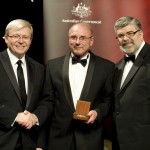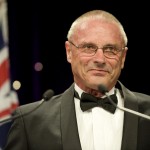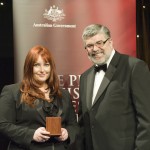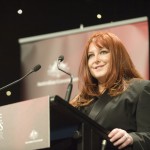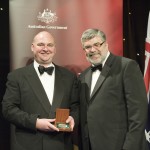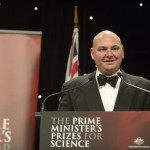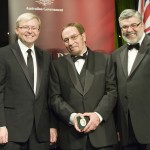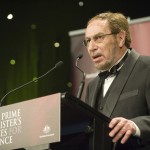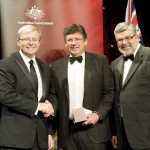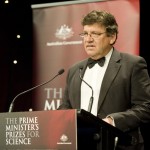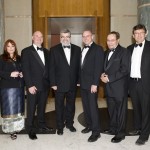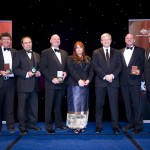2009 Prime Minister’s Prizes for Science winners:
John O’Sullivan: How astronomy freed the computer from its chains
Nearly a billion people use John O’Sullivan’s invention every day. When you use a WiFi network—at home, in the office or at the airport—you are using patented technology born of the work of John and his CSIRO colleagues.
They created a technology that made the wireless LAN fast and robust. And their solution came from John’s efforts to hear the faint radio whispers of exploding black holes.
Today John is working on technology that will allow us to look back almost to the beginning of time itself.
For his achievements in astronomy and wireless technologies John O’Sullivan receives the 2009 Prime Minister’s Prize for Science. [Read more]
Amanda Barnard: Testing new technologies in the computer not the real world
Every new technology brings opportunities and threats. Nanotechnology is no exception. It has the potential to create new materials that will dramatically improve drug delivery, medical diagnostics, clean and efficient energy, computing and more. But nanoparticles—materials made small, just a few millionths of a millimetre in size—could also have significant health and environmental impacts.
Amanda Barnard hopes to predict which nanoparticles will work most efficiently and which could be dangerous. Using supercomputers, she’s making the particles in the virtual world and testing how they interact in various environments before they get made in the real world. Her peers told her it couldn’t be done. But this young scientist proved them wrong and now leads the world in her field of nanomorphology—predicting the shape, structure and stability of nanoparticles.
For her early career achievements in modelling nanoparticles Amanda Barnard receives the 2009 Malcolm McIntosh Prize for Physical Scientist of the Year. [Read more]
Michael Cowley: Breaking the link between fat and diabetes
Why do we get fat? What’s the link between obesity, diabetes and hypertension? Can we break the link? These are critical questions for Australia’s long-term health, and Michael Cowley may have the answers.
He’s shown how our brains manage our consumption and storage of fat and sugar and how that can go wrong. He’s created a biotech company that’s trialling four obesity treatments.
Michael has shown unequivocally that losing weight isn’t just a matter of will power.
Now with his colleagues at Monash University he is discovering why obesity increases risks of heart disease and diabetes. And he’s developing therapies to break the connection between these conditions.
For his contribution to our understanding of metabolism and obesity, Michael Cowley receives the 2009 Science Minister’s Prize for Life Scientist of the Year. [Read more]
Len Altman: Creating new careers in the rocks
Geoscience is at the heart of some of humanity’s biggest challenges in the 21st Century: access to water; alternative energy sources like geothermal and hydro; and adapting to climate change. “So why,” asks Len Altman, “Are students in our schools more likely to learn about the moons of Jupiter or the rings of Saturn than about the planet Earth and its history?”
Len is changing that at Marden Senior School and at the schools in his region and state. Along the way he is helping more young people discover science, and helping mature students discover new careers in the minerals industries.
For his achievements in teaching geoscience Len Altman receives the Prime Minister’s Prize for Excellence in Science Teaching in Secondary Schools. [Read more]
Allan Whittome: Living science
Badgingarra Primary School is perched on a hill three hours north of Perth, looking out across fields of canola and wheat. The approach to the school is lined with sculptures of native animals and a model of the Solar System made in limestone, set amongst native plants. In the classroom the students are fine- tuning model racing cars they’ve designed and manufactured online. All this is due to the work of Allan Whittome.
In Allan’s classes the students live with the science—experiencing it and playing with it every day.
The school has embraced science and the investigative process. Students engage in science by choice—designing their own investigations, questioning ‘why?’ and formulating new or reaffirming answers to those questions.
Students participate in competitions, awards programs and community projects including the NATA Young Scientist of the Year awards, the Earthwatch Teachlive Whale Sharks of Ningaloo project, Community Hydrogen Fuel Vehicle Challenge and the F1in Schools program.
For his achievements in engaging young students in science Allan Whittome receives the Prime Minister’s Prize for Excellence in Science Teaching in Primary Schools. [Read more]

